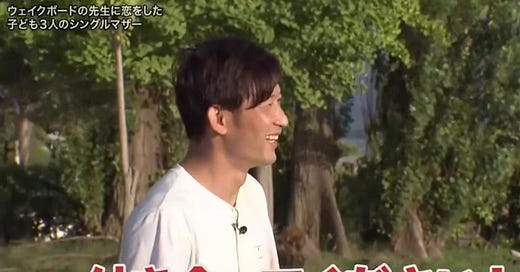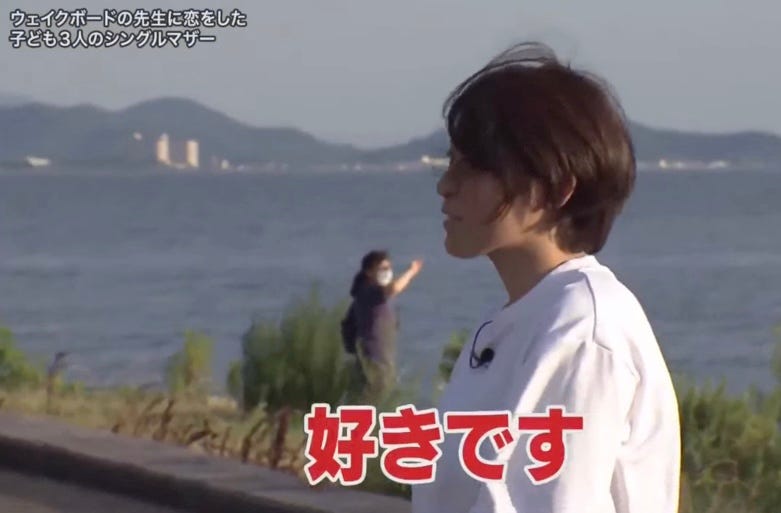This is How to Japanese, a monthly newsletter with something about Japan/Japanese and a dash of いろいろ.
日本・日本語: 告白
My television habit has continued unabated. The latest クール (cours) is starting to wind down, so I don’t have quite as many shows going. This only means that I need to start paying attention to the new shows coming out, which is a little more complicated when you don’t have a TV. [On a brief side note, the French word “cours” is used to refer to three-month blocks of time that make up a Japanese television “season.” This is just enough time for 9-12 episodes, after which the shows disappear into the ether…for the most part. Shows with multiple seasons seem to be the exception rather than the rule in Japan.]
The good news is that one of my favorite shows is an on-going reality show: 探偵!ナイトスクープ (Tantei! Knight Scoop). I mentioned this show briefly in February 2022, although I was just getting into it at that point. Now, seven months later, I have a deep, abiding love for this show.
At its core, the show is a 相談解決 (sōdan kaiketsu, lit. “advice solution” e.g. problem solving) program. Viewers write in for help solving problems. But the “problems” they solve are often bizarre. The friend who recommended the show to me even called it シュール (shūru, surreal). Two common problems are reuniting viewers with long-lost friends and family and helping others accomplish difficult (and obscure) goals.
Off the top of my head, the strangest one I can think of is when a guy wrote in that he wanted to prove he had the worst smelling feet. Well, the show found other guys in Japan who had smelly feet and enlisted a professional smeller of some sort to judge who had the worst smelling feet. Turns out that the guy who wrote in actually did have the smelliest feet. A quick internet search shows that this was a segment called 足のクサさに誇りを持つ男 (Ashi no kusasa ni hokori o motsu otoko, “Men who take pride in their stinky feet”) from the May 27 episode.
More recently, on the September 2 episode, in a less bizarre segment titled 先生に恋をしたシングルマザー (Sensei ni koi o shita shinguru mazā, “Single mother who fell in love with her teacher”), the show helped facilitate a good example of a 告白 (kokuhaku, confession).
I wrote about 告白 for the Japan Times last year and wanted to examine not only this confession but also the kindly worded rejection. To give some background, here’s a summary of the request: a mother of three in her early 40s has a crush on her wakeboarding teacher and wants help confessing her love for him. She’d never asked him out or even really expressed her feelings in any way, so this is a very sudden 告白, which seems to be how they’re often portrayed on television. In practice I highly doubt that 告白 happen this suddenly, and if they do, they must not have a very high rate of success.
The woman’s confession has the two requisite lines that I introduced in the article, but she makes use of some linguistic padding before the confession itself. Take a look:
私の得意料理はありません。私の苦手なことは洗濯を片付けることと整理整頓です。私の好きな人は片岡先生です。… 好きです。付き合ってくださう。
I don’t cook anything particularly well. I’m bad at putting away the laundry and keeping organized. And I love Kataoka-sensei. … I love you. Please go out with me.
(I left out a small bit here in front of the 好きです in which she just notes she’s had a crush on him since he first rolled in on his wakeboard.)
The two sentences before the confession effectively serves as a こんな私でよければ (Konna watashi de yokereba, “If you find little old me to be acceptable…”). Obviously I’ve taken license with that English translation, but the basic idea with this regularly used phrase is that you humble yourself before asking someone out. She’s just done it above in a funnier, more specific way. こんな私でよければ can also be used before accepting an offer (to date or otherwise).
You can tell from the look on his face that he’s truly surprised by this.
So how does he respond? First, by thanking her for the consideration:
その気持ちはすごい嬉しいし、ありがとうございます。
I really appreciate that sentiment - thank you very much.
Then he goes on to make an indirect rejection using 難しい (muzukashī, difficult), and he forecasts this rejection with the word ただ (tada, however/but), which is softer than some other conjunctions:
ただ、西澤さんは、生徒さんでもあるので、なかなかそこはちょっと難しいかなとは思います。
But you’re one of my students, which I think might make that somewhat difficult.
He also makes this sentence nice and choppy with an appropriately positioned そこは and とは to make this feel like a circumstantial rejection rather than one of personal preference. He ends (if I’ve heard him correctly) by again expressing appreciation for her feelings:
気持ちは素直に受け止めて…
I take your sentiment seriously…
I feel like this contains a basic communication lesson beyond Japanese grammar. This guy was probably thinking, “This lady must be out of her mind - she’s standing here in front of her kids confessing that she has a massive crush on her wakeboarding teacher,” but that clearly wasn’t something he was going to say explicitly. Consideration for her feelings was paramount, and I think that’s something we can probably all improve on.
いろいろ
Speaking of Tantei! Knight Scoop, the most recent episode was briefly pulled from online streaming service TVer so that a segment could be edited out. I happened to notice in real time, which gave me the chance to investigate. Check out this Twitter thread to see an example of how Japan censors content and what kind of content gets cut. It’s a little surprising. The full video is available out there online for savvy Googlers (as is the 告白 episode discussed above).
I just finished up Murakami Fest Year 15 over on the blog! Each week of September, I take a close look at writing by Murakami Haruki that has not yet been translated. This year I dug into a small part of the treasures I found at the National Diet Library. Here’s the post for Week 5, which includes links to all past Murakami Fest posts.
My college classmate Jon Morosi has an excellent look at Murakami Munetaka’s incredible season. At one point he hit five home runs in a row! There is some excellent footage from the crowds out there on Twitter.
 Japan has another Murakami drawing international attention. Great reporting here by @jonmorosi.Munetaka Murakami just hit his 54th home run. He’s 1 away from tying the great Sadaharu Oh. The home run chase never sleeps. Here’s my look at the 22-year-old phenom, thanks to @CySneed and @PatrickKivlehan. @MLBNetwork @swallowspr https://t.co/6wERtMl6da
Japan has another Murakami drawing international attention. Great reporting here by @jonmorosi.Munetaka Murakami just hit his 54th home run. He’s 1 away from tying the great Sadaharu Oh. The home run chase never sleeps. Here’s my look at the 22-year-old phenom, thanks to @CySneed and @PatrickKivlehan. @MLBNetwork @swallowspr https://t.co/6wERtMl6da Jon Morosi @jonmorosi
Jon Morosi @jonmorosiI did Zwanze Day in my third city and second country last weekend. It was a super pleasant event, and I urge you to seek it out in Japan.
Don’t sleep on Kobe Spice if you live in Japan and need lentils.











